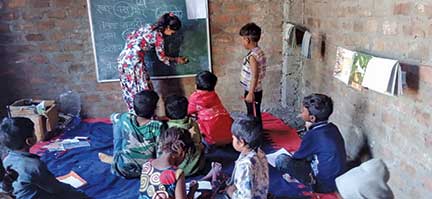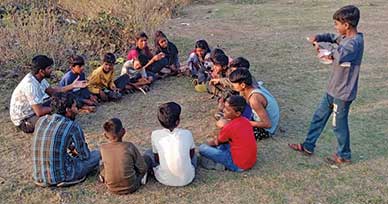Sawni, Sanjhali, and Tasveer are all from the Pardhi community in Bhopal. They share their experiences, struggles, and thoughts on what can be done to improve the situations of communities like theirs. Sawni is a first year college student in Bhopal. Sanjhali studied till class 12. Tasveer, is a lawyer. Once skilled trappers with deep knowledge about forests and their conservation, their livelihoods were criminalized by Forest Acts during the British times. The community was listed in the Criminal Tribes Act of 1871. This Act was repealed in 1952 and ever since the Pardhis along with a few other communities have been known as de-notified tribes. However, these tribes have been included in the Habitual Offenders Act of 1952. Thus more than 150 years after being labelled criminal, they are still unable to overcome their stigma and harassment.
These communities have not been beneficiaries of positive discrimination policies in Bhopal as they are not often a part of the Scheduled Caste or Tribe list. Their lives and struggles for education, we hope will help us question the many assumptions about merit and educational advancement and work to create a more equitable society.
These are first generation girls and boys who have beaten the odds to get an education. Muskaan, an organization that works to empower children and young adults through education in Bhopal has been a constant support in their oppressed journeys.
(Translated and put together by Anjali Noronha)
Sawni
I am the youngest of five sisters of a Pardhi family, living in Rajeev Nagar, Bhopal. We had a younger brother too, but he died in an accident at the age of two. My life has been a constant struggle to educate myself. I am doing my first year BA now. My mother used to collect waste. My father sold watches, balloons, etc., in the bastis apart from also helping my mother collect waste. We lost both our parents while we were very young. My uncles distributed all that we had amongst themselves, including us.
We were made to beg and collect waste. The money that we thus earned was taken by my uncles. They beat us if we complained or said we wanted to go to school.

I love to study. Among the Pardhis, girls are discouraged from studying. When I was very young and my parents were still alive, my elder sisters used to teach me at home. They would go to the Muskan residential camps and when they returned there would be a lot of change in them. I felt like going too.
Muskaan had opened a centre in our locality, where we would go to study and play. We used to like it a lot. We were taken out for excursions and taught to sing songs too, particularly jan geet. Muskaan volunteers taught us in pardhi language. This helped us understand what we were being taught much better and instilled in us an interest to study.
When I was at my uncle’s place, I used to get beaten for studying. One day in 2014, I decided to run away. Muskaan volunteers gave me shelter in their homes and helped me study. I used to study two hours in the morning and two in the evening. They arranged for my admission into class 5. I would attend school some days and stay with Muskaan volunteers on others.
I went to live with one of my elder sisters for sometime. I was admitted to a private school in class 6 and secured a scholarship that helped pay the fees. Then I joined the Muskaan school. I was advised to stay in their hostel as Muskaan knew that Pardhi girls would not be able to study if they continued to live in their community. After class 8, I studied in a government school and passed class 10 with Muskaan’s help.
After class 10, I was convinced to return home and was married off immediately. My in-laws didn’t allow me to study. Whenever I spoke of continuing my studies, I would get beaten up. I was forced to pick rags and do other menial works. So I ran away from my husband’s home as well and completed my class 12 through NIOS with help from Muskaan.
I was staying in the Muskaan hostel during this time. There were boys there too. I was in my teens and would get attracted to them. Others in the hostel would call me names and say that I am characterless. They would complain to didi and bhaiya, who were in charge of all of us living in the hostel. This atmosphere quite depressed me. I was not able to concentrate on my studies. I felt like running away from the hostel too. But didi and bhaiya helped me through this phase.
People from my community would also taunt me. They would openly say that I would not be able to study, that I was only interested in boys, and that I would run away with a man from another community. All this would make me feel like giving up. But I carried on and passed class 12 and secured admission in college for graduation.
One day, sometime in 2018-19, during a special assembly in Muskaan, some children spoke about Savitribai and Jyotirao Phule. We sang songs of their struggle. It was very motivating for me. Savitribai had to struggle so much more than a 100 years ago, not only to educate herself but also many other underprivileged boys and girls. I thought if she could do it, so could I. And that has helped me to continue my studies. The help I got from Muskaan has been immense. But there are very few girls from our community who are continuing into college.
In college, I got involved in a film group called Ektara collective. I got trained in the art of cinematic lighting and also acted in two of their films – Rahgir and Apni ek Jagah. For one year, I lived in Mumbai and worked in many ad films and web series like Mirzapur. I am working while studying and supporting myself. I want to highlight the struggles of my community, especially our women, through film and help them fight oppression.
Sanjhali
We are four brothers and sisters. One brother and sister are in college. My younger brother is in class 8. I studied till class 12 with help from Muskaan. I had to discontinue my studies after marriage. Girls from our community are not allowed to study. Instead we go ragpicking. Muskan volunteers first started teaching us in the centre they opened in our basti. Then they took us to the Muskaan school. I studied in Muskaan from class 1 to 5, then did class 6 and 7 from a government school and again class 8 to 12 in Muskaan.
Like other girls from my community, getting educated was a challenge for me. Girls get very little or no support from their families and in formal school nobody bothers to understand our situation and we get scolded there too.

Tasveer
I live in Rajiv Nagar, Bhopal. We are three brothers and one sister. I am the oldest. I have finished my LLB after a long struggle. Muskaan helped me in my educational journey. I am the first lawyer from my community. I can now help people from my community fight the criminal charges they face almost everyday.
My younger brother has finished his class 12 and has secured admission in Azim Premji University. He is studying history honours. The youngest is doing his 12th this year. I regret that my sister was unable to study. My father used to have a grocery store in the basti.
My father was educated till class 4 or 5. He admitted me to a private school in class 1. Muskaan started teaching older children in our basti. This was around 2003-04. I was about 7 years old. I liked to study and my father would teach me at home.
Muskan used to have community meetings on the importance of education. My father and a few other families decided to keep us children in school. Knowing our financial situation, Muskaan partly helped in paying our fees. There were more boys than girls going to school from the Gond and Pardhi communities.
Most of us would go to school after ragpicking early in the morning. We would come home, have a bath, and then go to school. Teachers would pressurize us to stop this work. They’d say we did dirty work. The Gond children would also pick up waste from the vegetable market.
Children from upper caste colonies also came to the same school. We understood discrimination from an early age. We learnt that different castes and classes had access to different kinds of education. We would wonder whether to question this discrimination or let it go. Even in class 1, children from the Pardhi community were made to sit in a different classroom. The language in school was also alien to us. We were familiar with Hindi but not fluent in it. Teachers would not teach us and scolded us a lot.
We were forced to leave school after class 3, because from then on the medium of instruction changed to English. Therefore, I started studying in the Muskaan basti centre. Muskaan prepared me for the class 5 board exam. I failed in the first attempt. I did not give up. I continued with support from Muskaan and cleared class 5. I finished class 12 from the Muskaan school.
Through all of this, we, as Pardhis, did not get any government support by way of scholarship as we’re listed in the general category in Bhopal district.
I did a survey across the state on the number of children from our community reaching high school and college and found that there are only about 50-100 finishing high school out of a population of 10-12000 in Madhya Pradesh!
The main challenge in educating Pardhi children today is that they are still put to work early. Pardhi people do dream of an education for their children, but they are insecure about their livelihood. So they want an education that also gives them a better livelihood. They are not so open to the idea of educating girls. They think that educated girls will run away to other communities.
Another challenge is that most Pardhis still have a nomadic lifestyle. This affects their access to education, which requires stability. Till families are itinerant and migrating for livelihood – they migrate for months and return to their village during festivals – education of Pardhi children is not going to be easy. If governments are to change the lives of these children, there is a need for residential schools.
Another reason is their poor economic level. Their skills are not enough to sustain them in one place. There is a need to figure out what a stable livelihood can be for them. The skills of the Pardhis and other de-notified tribes have been criminalized under various Acts. In order for them to get a dignified livelihood, they need to form a separate category and plans have to be made for their development.
Along with a few of my friends from the community, I have set up a youth group called MAJAL. Through this group we help young people understand the issues our communities face and take collective action through libraries, theatre, and discussion. We fight against patriarchal mindsets in our own communities and support young people in their education.
